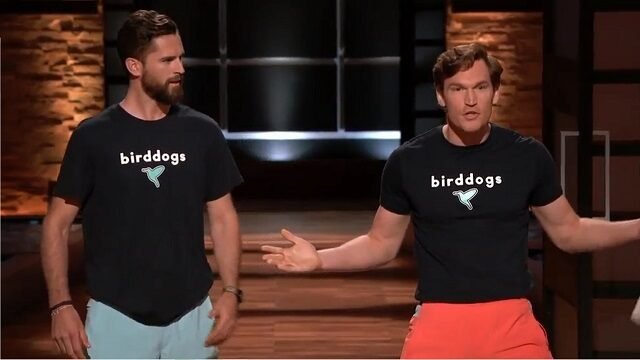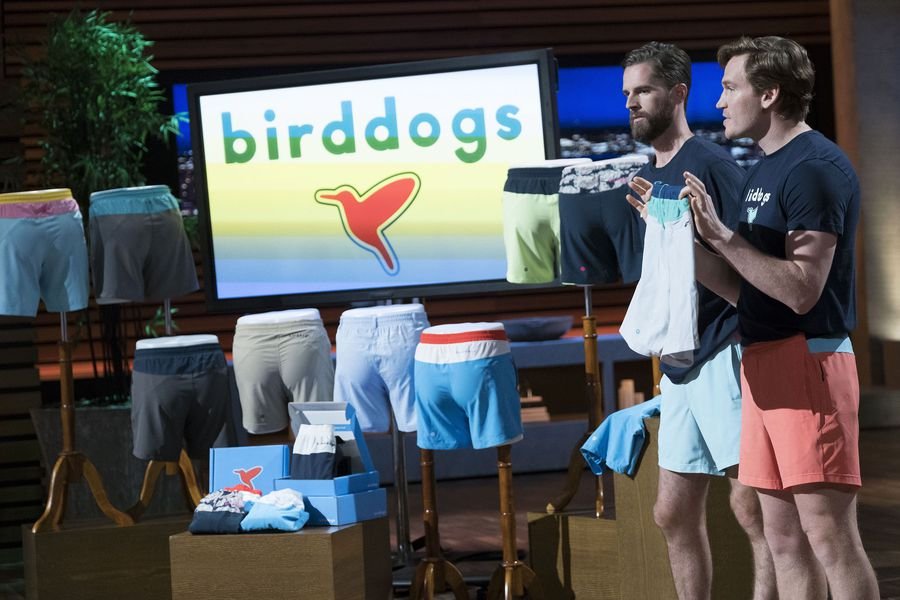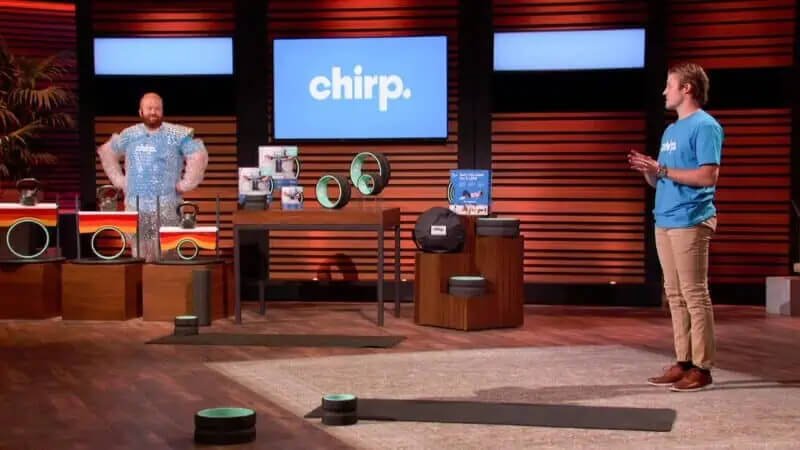Let’s clear something up: Just pitching on Shark Tank doesn’t make you an instant overnight millionaire. Sure, some founders walk away with a handshake and a chunk of investor cash. Most don’t. Then there’s Bird Dogs—the men’s gym shorts brand that kicked open the Shark Tank doors with swagger, built-in underwear, and big-league sales. If you want myth-busting and real business lessons, pull up a chair.
Contents
ToggleThe Founders of Bird Dogs: Outsiders With Something to Prove
It all started with Peter Baldwin and Chris Mason. These two aren’t your standard tech bros or ex-athletes with a pet project. They saw a lane in men’s comfort nobody else noticed—shorts with built-in underwear. It’s not rocket science, but sometimes lucrative ideas aren’t.
Baldwin and Mason knew the pain: jumbled gym bags, misfit undies, shorts riding up. Their solution? One pair, grab-and-go, all-day comfort with nothing extra needed. Sounds simple, but simple sells when you get it right.
Bird Dogs on Shark Tank: What Actually Happened?
Season 9, Episode 14. The room’s hungry. These guys stroll in, cool as ice, pitching $250,000 for just 1.5% equity. That’s a $16.7 million valuation—ballsy. If you’ve watched enough Shark Tank, you could hear Mark Cuban’s eyebrows hit the ceiling from your couch.
The pitch? Full of puns, a bit corny, and more self-confidence than Elon Musk on a launchpad. The Bird Dogs crew brought samples, passed them around, and flexed sales numbers that would make plenty of founders jealous.
The sales rundown:
- Year One: $200,000
- Year Two: $2.1 million
- Projected Year Three: $6 million
For gym shorts. Not a patented gadget, not vitamin-infused super socks—shorts.

Crunching the Numbers: Was the Valuation Real or Too High?
Let’s talk about their math. Bird Dogs came in at $16.7 million (because $250K/1.5% = $16.67M, right?). Investors don’t always buy projections, especially on TV. The founders bet big because their margins were huge and growth was steep.
Production: $18 a pair.
Retail price: $55 a pair.
Net profit per pair: $37 after shipping and marketing.
These are impressive margins—on par with DTC darlings like Bombas or MeUndies. If you’ve chased direct-to-consumer dreams, you know these numbers turn heads.
But here’s the kicker: the company had outside investors already owning 11%, and they admitted inventory was their biggest headache. If you go on Shark Tank with big revenue but say you can’t keep up on supply, prepare to be roasted.
The Sharks Respond: Tough Love or Blew the Call?
Each Shark had their own take, but the vibe was clear. Mark Cuban called foul on their planning. Lori Greiner gave them a pun about birddogging the answers and walked out. Robert Herjavec went straight for the jugular: You’re full of BS. That’s the stuff you hope stays in the cutting room.
Daymond John and Kevin O’Leary didn’t mince words either. O’Leary thought they’d be too difficult to work with. Nobody made an offer. For founders, you dream Shark drama means a bidding war—not this kind of grilling.
Here’s the thing: this wasn’t about numbers alone. The Sharks saw confidence as cockiness. I’ve been in pitch rooms where that’s an asset, but you have to read the room. If you walk in acting like you know it all, you’d better have answers for every problem—not new ones like poor inventory planning.
Bird Dogs Net Worth: On TV vs. Reality
So, did Bird Dogs get laughed off the stage? Far from it. They walked, heads high, holding their $16.7 million valuation with no deal. Some call this foolish arrogance. I call it founder conviction—risky, but it sometimes pays off.
Afterward, Bird Dogs kept playing to their own script. They didn’t need Shark Tank money to keep selling shorts. As of 2024, Bird Dogs is still running—and word on the street (and search results, and SharkWorth analysis) says they’re doing well. Exact numbers are still private, but with their rapid year-over-year revenue, it’s safe to say they passed the $10 million mark and likely even higher.
Why? Strong brand identity, a clear customer promise, and a product that solves a real pain point—plus, their DTC strategy wasn’t dependent on retail shelf space or TV infomercials. Think Bombas, but less about socks and more about freedom below the belt.

Did the Sharks Miss Out? Honest Feedback or a Missed Payday?
Here’s where the debate starts. Did Cuban and crew miss out? Sometimes hindsight makes everyone a genius. Look, I’ve seen Shark Tank passes age like milk (Scrub Daddy), but most fizzle soon after the cameras click off. Bird Dogs stuck around and kept scaling.
Yes, their founders were brash, but sometimes that’s what it takes. Sometimes you don’t want an investor looking over your shoulder. Sometimes you walk away, get back to work, and prove the doubters wrong. Bird Dogs used TV exposure for rocket-fuel marketing—all eyes on the brand—which likely shot their online sales higher.
So did the Sharks miss out? I’d say they left money on the table—but the founders’ style wasn’t every investor’s cup of tea.
Where Is Bird Dogs Now?
Fast-forward to now, after the hype and Shark banter faded. Most post-Tank brands vanish, a page on SharkWorth’s whatever happened to… list. Not here. Bird Dogs is not only alive, they’re thriving. They’ve stuck to their core DTC model—online only, no big box store distractions, just focused marketing and smart customer acquisition.
The shorts? Still built-in underwear, still for guys tired of fussing with layers. They’ve expanded styles, doubled down on clever, cheeky ad campaigns, and doubled down on lifestyle branding. Walk around any gym, frat house, pickleball court, or CrossFit box—you’ll see the bulldog logo.
Did they fix their inventory headaches? They had to, or they’d have been sunk. Finding the right manufacturer and smoothing out fulfillment is the kind of grind that doesn’t make for sexy TV, but it’s the stuff that separates successful startups from one-hit wonders.
Bird Dogs’ Secret Weapon: Brand Identity and Relentless Focus
Was it just about the built-in underwear? No chance. Bird Dogs kept things simple. They didn’t branch into twenty categories before winning their core market. Smart. Look at any DTC brand with staying power—focus first, then expand. Think Allbirds and their wool runners, or Bombas and their socks.
Their tone is goofy, irreverent, and a little in-your-face—just like their pitch. And for their target demo? That stuff sells. The shorts are comfortable. The marketing is memorable. And the product solves a simple problem for a big chunk of men.
Lessons from a No-Deal Pitch: What Entrepreneurs Should Really Take Away
I’ll say it straight: not getting a Shark Tank deal isn’t the end. Sometimes it’s the best thing that can happen. Bird Dogs is a case study in turning a no into a massive brand-building moment.
What worked for them?
- Huge gross margins—they could outspend on customer acquisition.
- Relentless brand focus—they didn’t get distracted.
- Leveraged TV for marketing, not just for cash.
- Confidence that sometimes spilled over into arrogance, but for founders, self-belief often counts most.
What should you learn if you’re prepping for your own Shark Tank pitch or just dreaming about your business?
- Know your numbers cold. Be honest about your weaknesses.
- Confidence sells, but so does coachability. Balance both.
- A no from big fish doesn’t mean your business is over. Sometimes it means you keep 100% ownership and run it your way.
- Use every stage, every platform, to create awareness. The best brands never let the spotlight go to waste.
FAQs
Is Bird Dogs still in business after Shark Tank?
Yes. Bird Dogs is alive, kicking, and still selling gym shorts with built-in underwear. The business is active and expanding even after all five Sharks passed.
How much is Bird Dogs worth now?
Exact numbers are private, but estimates put Bird Dogs’ net worth well into the tens of millions in 2024, thanks to strong revenue and a lasting brand.
Did the Sharks regret passing on Bird Dogs?
No public regrets, but with their ongoing success, it’s safe to say at least one Shark wishes they got a bite (and a chunk of equity) at a $16.7 million valuation.
Who owns Bird Dogs today?
Founders Peter Baldwin and Chris Mason are still steering the ship, along with their investors who held 11% at the time of their TV pitch.
What made the Sharks walk away?
They didn’t like the founders’ aggressive attitude, high valuation, and admission of inventory problems. The combination killed the vibe.
Are Bird Dogs shorts actually popular?
Absolutely. Bird Dogs has a cult following in gyms, on campus, and among guys who like practical style. The online buzz is real.
Did Bird Dogs fix their inventory problems?
They’d have been dead in the water if they hadn’t. They clearly tightened up operations—still selling strong, years later.
Can a business succeed without Shark Tank money?
Bird Dogs proves it. Not every no from the Sharks is a closed door. Sometimes, it’s just an invitation to grind harder and build it your way.
The Real Takeaway: Hustle Survives Past TV Drama
Here’s how I break it down: Bird Dogs didn’t win the money, but they won the long game. If you’re pitching with honest numbers, relentless focus, and a product people want—no Shark can stop you. The drama ends when cameras stop rolling. The real work starts then.
If you want inside lines on net worths, what happened after the Tank, and who’s making bank now, keep checking SharkWorth. Track the real stories, not just the TV moments.
And remember: Audacity might lose you a deal with the Sharks, but it could win you a tribe of customers who know exactly what they want in a pair of shorts. Now, that’s real business.










